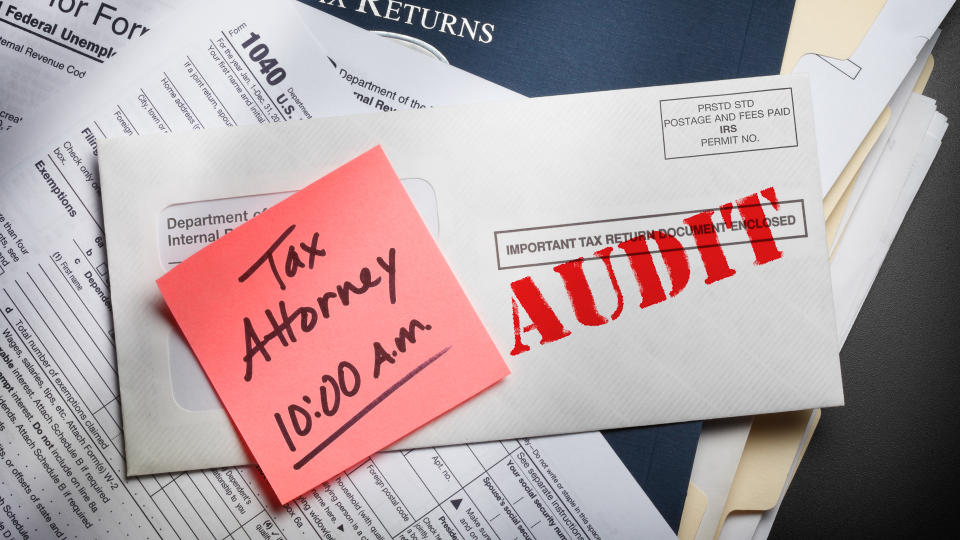5 Tax Audit Secrets the IRS Won’t Tell You

One of the reasons that the thought of a tax audit strikes fear into the hearts of many Americans is that the process seems so mysterious.
Read: Billionaires vs. the Middle Class: Who Pays More in Taxes?
See: Owe Money to the IRS? Most People Don’t Realize They Should Do This One Thing
When you send off your tax return every year, there’s no real way of knowing whether you’re going to wake up one day with a nasty notice in the mail from the IRS. The thought of going face to face with a government official who has the authority to demand additional money from you — or even cart you off to prison — is no doubt daunting for many.
But the reality is that the fear of audits is generally overblown in the American imagination. To cut down on your chances of being audited, of course, you should file a thorough, accurate and complete return every year.
If you still worry about being the subject of a tax audit, perhaps these secrets that the IRS might not necessarily advertise can help put your mind at ease.

Your Chance of Being Audited in Any Given Year Is Tiny
For all of the fear that audits engender in the American psyche, the truth is that your chances of being audited in any given year are exceedingly small. For fiscal year 2022, the IRS audited just two out of every 1,000 tax returns for middle-income Americans.
While certain categories of taxpayers faced higher audit rates — particularly those at the lowest and highest ends of the income spectrum — the average audit rate overall was still less than 0.20% for 2022 returns.
Next: The 7 Worst Things You Can Do If You Owe the IRS
Learn: Trump-Era Tax Cuts Are Expiring — How Changes Will Impact Retirees
Sponsored: Credit card debt keeping you up at night? Find out if you can reduce your debt with these 3 steps

Most Audits Are Conducted by Mail
If you think of an audit as an intimidating meeting in person with a revenue agent, you can relax. While it’s true that there are such things as in-person field audits, the reality is that more than 70% of IRS audits are so-called “correspondence audits.”
This means that you simply receive a letter in the mail from the IRS asking for clarification about a specific item or items on your tax return. If you simply accept the findings of the IRS and write a check for what it says you owe, that will be the end of your audit experience.
Next: IRS Increases Gift and Estate Tax Exempt Limits — Here’s How Much You Can Give Without Paying

You Can ‘Beat’ an IRS Audit
If you’ve filed a legitimate return, you have nothing to fear from an IRS audit. As long as you can document that what you claim on your tax return is accurate, just respond to the IRS in a timely manner. If you can clearly substantiate your claims, your audit likely will be over without any adjustments.
While the best way to avoid an audit is to file a return without red flags, you should never fear claiming all of the deductions and tax credits to which you’re entitled. Even if you trigger a notice from the IRS, as long as all of your paperwork is in order — and you respond to the IRS within your given timeline — you should be able to plead your case and “beat” the audit.

Even If You Lose, Your Consequences Are Likely Only Financial
One fear that some Americans have is that they will face jail time if they are audited. In reality, this is highly unlikely. In most cases, if you’re audited and can’t defend your return, you’ll have to pay the taxes that you legally owe and some penalties and/or interest.
While that’s never a pleasant experience, it certainly beats going to prison. Jail time for tax offenses is reserved for egregious examples of fraud or tax evasion. For example, if you knowingly falsify documents you submit to the IRS for large sums of money over several years, yes, you may face jail time.
But if you simply make math errors on your return or claim a deduction in good faith that the IRS disallows, your penalties are typically only financial.
If you need help working out a resolution for your tax debt, it can pay off to reach out to professionals. Tax Relief Advocates, for example, is a company that can assist you in working with the IRS to reduce your tax debt and come up with a resolution.

You’ll Usually Get Audited Only in the First Two Years After You File
The IRS generally audits tax returns only in the two years after they are filed and will look at returns from just the last three years. That time frame can be extended in the case of fraud or other substantial error. But even under that scenario, the IRS generally won’t look back more than six years.
Usually, you’ll hear from the IRS in the first two years after you file your return, if you’re going to be audited. This means you don’t have to go the rest of your life looking over your shoulder about a tax return you filed 10 years ago.
More From GOBankingRates
This article originally appeared on GOBankingRates.com: 5 Tax Audit Secrets the IRS Won’t Tell You
